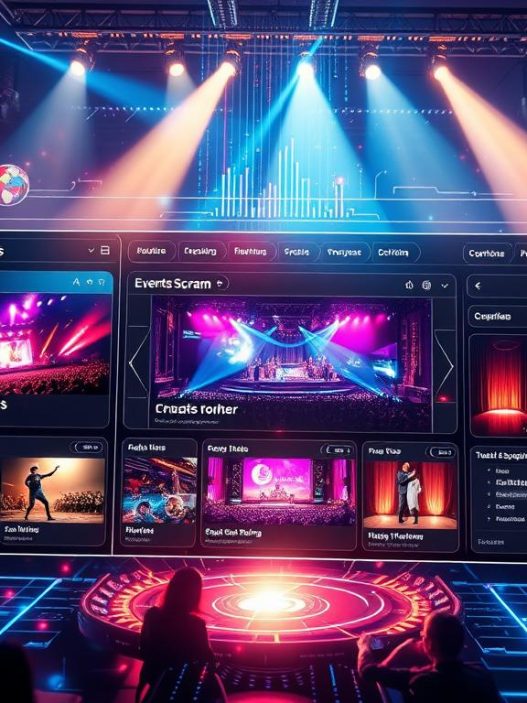In 2023, using artificial intelligence (AI) in marketing strategies is essential. It brings unique advancements. The marketing trends AI tool scene is growing fast. This growth leads to new tools that help improve marketing results. Companies of all sizes are looking into AI’s power in marketing, especially generative AI. This AI is changing how we create content and connect with customers.
Companies are planning to spend nearly $50 billion on AI startups like OpenAI and Anthropic. This shows how much the business world values these technologies. About 70% of business people now use generative AI in their work. This shows it’s becoming common. Looking ahead in 2023, we expect more money will go into AI for marketing. This will make businesses run better and help them make smarter decisions.
Key Takeaways
- 2023 marks a significant year for AI integration in marketing.
- Generative AI is transforming content creation and customer engagement.
- Investment in AI startups reached nearly $50 billion in 2023.
- 70% of business professionals are engaging with generative AI technology.
- The demand for hyper-personalization in marketing is expected to surge.
- Predictive analytics will play a crucial role in shaping marketing strategies.
Introduction to AI in Marketing Trends
AI in marketing shows a big change in the industry. Many businesses use AI to look closely at big data and guess customer actions better. About 54% of companies save money and work more smoothly by using AI to automate tasks.
In the digital marketing world, 68% of marketers now use AI daily. AI helps make customer service better, with 56% of businesses seeing greater efficiency. Also, 30% of organizations report that AI saves their employees a lot of time.
The market for AI in marketing is expected to boom, growing from $15.84 billion in 2021 to over $107.5 billion by 2028. This growth shows how critical AI is in marketing strategies, according to the Marketing AI Institute’s 2023 report. AI helps in giving personalized suggestions on Spotify and Netflix and in using chatbots. These chatbots help 55% of B2B marketers in the U.S. find new leads.
Even with these advantages, some challenges like transparency and data quality remain. To use AI well, businesses need to understand the available tools. They should brainstorm and keep improving their strategies. This way, they can do well in the quickly changing digital world.
Current Landscape of Marketing Trends AI Tool Insights
The digital marketing world is changing fast, thanks to machine learning. Using AI in marketing helps businesses work better and faster.
Experts think the AI market will grow to over $107.5 billion by 2028. Companies use AI to predict trends and do tasks without human help. AI has moved from a special option to a major tool for marketing on many platforms.
- Anyword and INK help over 1 million users, moving towards AI solutions.
- Optimove is great at using many channels for marketing, known for its success.
- Scalenut helps over 1 million marketers worldwide, showing AI’s wide use.
- Copy.ai has over 10 million users, showing many marketers prefer it.
AI helps make smart decisions by predicting what customers will want. It makes marketing more personal, which gets more people to buy things.
Companies now focus on making unique experiences with data analytics to earn more. Automation makes work easier, letting marketers focus on big ideas. It also makes campaigns better by using up-to-the-minute data.
Generative AI as a Game Changer in Marketing
Generative AI is changing the game in marketing. It makes creating content faster and personalizing experiences easier for customers. Marketers use generative AI to generate text, images, and videos quickly. This leads to better content that meets customer needs. This move shows that AI in marketing is growing, blending data with creative ideas.
Capabilities of Generative AI for Content Creation
Generative AI goes beyond just making content. It offers big benefits:
- Speed: It creates different types of content in minutes, saving lots of time.
- Personalization: Marketers can make unique experiences for each customer, making communications more effective.
- Cost Efficiency: Automating content helps use money better and boosts investment returns.
- Market Insights: Generative AI spots market trends and customer data, aiding in creating messages that hit the mark.
Emerging Tools for Generative AI in Marketing
There are many new tools for generative AI, each with its special features for marketers. Some important ones include:
| Tool | Features | Use Cases |
|---|---|---|
| ChatGPT | Text generation, personalized interactions | Customer service, content creation |
| DALL-E | Image and graphic generation from text descriptions | Marketing materials, social media posts |
| Jasper | AI-driven copywriting, SEO optimization | Blog posts, ad copy, social media content |
| Writesonic | Automated content generation, multi-format output | Email marketing, product descriptions |
Generative AI’s growth will likely boost marketing creativity and efficiency. Companies that use AI in their marketing strategies will likely stand out. They’ll be leaders in a competitive market.
Predictive Analytics in Marketing: Enhancing Decision Making
Predictive analytics make a big leap in marketing decisions thanks to AI. It uses machine learning on past data to find patterns. This helps plan better campaigns and use resources well, making customer interactions better.
How Predictive Analytics Improves Campaign Performance
Predictive analytics brings many advantages to marketing. It leads to smarter decisions, helping marketers use resources wisely and connect with customers efficiently. Specifically, it allows for:
- Customer segmentation: Helps refine strategies with detailed segmentation techniques.
- Personalized campaigns: Boosts engagement and sales with designed for you marketing efforts.
- Optimization of budgets: Uses data to predict outcomes and smartly assign resources.
Tools for Implementing Predictive Analytics
There are tools that make using predictive analytics easy. They support various needs:
| Tool | Description |
|---|---|
| Pecan | Lets data analysts build predictive models easily, knowing just basic SQL. |
| Plat.AI | Has a no-code needed engine for creating and using models. |
| DataRobot | Offers a big platform for predictive and generative AI, with lots of data support. |
In summary, AI and predictive analytics change marketing strategy for the better. They offer precise tools for making smart decisions and improving campaign results.
Marketing Trends AI Tool: The Rise of Automation
The marketing world is drastically changing, thanks to automation. Businesses now rely on AI tools to make work easier and improve their marketing tactics. These tools handle social media, emails, and customer engagement with little human effort.
By 2025, Millennials and Gen Z will drive 62% of global social eCommerce sales. This shift makes it vital for businesses to use efficient marketing tools to remain competitive. Automation helps reduce workload and lets marketers focus on creative strategies. These strategies appeal to younger shoppers.
Now, analyzing data is crucial in marketing. By 2024, companies plan to use AI for data analysis. This will help them make smarter decisions. Already, 87% of marketers have tried using AI in their work.
Chatbots are leading conversational marketing, offering more personalized experiences. They help solve the issue for 61% of customers who think traditional marketing ignores them. Automation ensures businesses meet customer needs effectively.
AI’s value in marketing may hit over $107 billion by 2028, showing its growing impact. With a push towards sustainability and new tech like virtual reality, automation’s role becomes key. It helps brands stay ahead in a tough market.
Conversational AI: Transforming Customer Engagement
Conversational AI has changed how we talk to customers in many fields. It lets businesses have better chats with people, quickly answer questions, and make customers happier.
Applications of Conversational AI in Business
Many companies now use conversational AI in their plans. This is important for:
- Retail and e-commerce: Conversational AI ups online sales by 30% by making shopping feel more personal.
- Customer support: Using AI, firms answer questions 40% faster, pleasing their customers.
- Healthcare: With AI, patients wait less by 25%, and doctors are 35% more correct in figuring out what’s wrong.
- Financial services: Banks and similar businesses see a 20% jump in customer activity and keep 15% more customers, thanks to AI.
- Education: Schools and colleges report 40% more student participation and a 25% better result in learning.
This shows that AI strategies in marketing really do work. They make customers happier and operations smoother. Plus, 74% of leaders think bad customer experiences can really hurt a business’s money-making.
Future of Chatbots and Customer Service
The outlook for conversational AI is bright. Chatbots are getting better at talking like humans. This could majorly change how we help customers. Almost half of all businesses worry that if they don’t use AI, they’ll fall behind.
- User self-service automation (97%)
- Real-time agent assistance (87%)
Companies that use conversational AI see many good changes. They get better at helping (69%), cut down on waiting (55%), and make customers happier (48%). There are hurdles, like training (30%) and fitting AI in (23%). But, the chance to better connect with customers is clear. With smart planning, businesses can use conversational AI for amazing customer talks.
Personalization through AI: Meeting Customer Expectations
Marketing is getting a personal touch with AI technologies. This is changing the way brands interact with people. Around 79 zettabytes of data were created worldwide in 2021. By 2025, this is expected to jump to 181 zettabytes. With so much data, marketers can use AI to offer personalized experiences that really speak to what consumers want.
AI and machine learning help in understanding and grouping customers better. This helps send very specific messages and deals. Companies now can quickly provide content, products, and services tailored to each person with AI. This leads to interactions that customers find valuable, improving their satisfaction and loyalty.
AI is making a big difference in how companies connect with customers. For example, chatbots powered by AI are always available to help, making customer service smoother and available in many languages. With 92% of companies using AI for personalization, it’s clear that it’s key for growth and better customer experiences.
- 76% of people are more likely to buy again from brands that personalize their experience.
- AI helps make shopping suggestions that fit just right, lowering the rate of people leaving their shopping carts, which was around 70% in 2024.
- Three out of four leaders in business see AI personalization as essential for staying ahead.
AI crunches through customer info to make interactions very personal. This helps build strong, lasting relationships with customers. As companies adopt more of these practices, making marketing personal will become even more important. This ensures that businesses don’t just meet customer needs—they go beyond.
Conclusion
In 2023, the marketing world is seeing big changes. Artificial intelligence (AI) is now a key element in creating marketing plans. Companies are using AI to get better at studying the market and talking to customers. This makes their work smoother and helps produce great results. To use these tech tools well, marketers need to stay flexible and up-to-date.
SEMRush Market Explorer and AI Persona Builder are at the forefront of AI in marketing. They’re not just about doing jobs faster. They offer deep insights that help teams work on big strategies. This shows how AI and people can work together, making each other better. It’s vital to bring AI into the heart of marketing work.
This year, we’re seeing a jump in AI use in marketing, from 21% in 2022 to 74% in 2023. This big shift means marketers have to quickly get on board with AI. A lot of the industry is now focusing on AI for better work and results. The rise of AI in marketing is changing the game. It’s reinventing how businesses reach out to people and grow.









